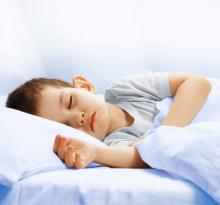Preschoolers with shorter nighttime sleep duration are more likely to exhibit aggression, tantrums, and other externalizing behaviors, according to a large, nationally representative study.
"Pediatricians now can have a clearer picture of how many hours preschool children are sleeping in this country. In addition, from this study we do know now that there is an association on a population level between externalizing behaviors and shorter sleep duration," said Dr. Ruth E.K. Stein.
In a study of 8,900 children, born in 2001, who participated in the ECLS-B (Early Childhood Longitudinal Study–Birth Cohort), parents provided their child’s typical weekday bed times and wake up times at the data collection point when their child turned 4 years old. They also rated their child on the PKBS-2 (Preschool and Kindergarten Behavior Scale, 2nd ed.). This instrument assesses six externalizing behaviors (overactivity, anger, aggression, impulsivity, tantrums, and annoyance) on a scale of 1 (never) to 5 (very often).
The 4-year-olds slept a mean of 10.47 hours per night, with a mean bed time of 8:39 p.m. and a wake up time of 7:13 a.m.
Short sleepers were defined as children who averaged less than 9.5 hours of sleep per night – that is, 1 standard deviation or more below the mean. These short sleepers differed significantly on all six externalizing behaviors, compared with preschoolers who averaged at least 9.5 hours of sleep per night. For example, overactivity (the most commonly reported externalizing behavior) occurred often in 25% of preschoolers who got at least 9.5 hours of sleep per night compared with 33% of short sleepers, according to Dr. Stein, professor of pediatrics at Albert Einstein College of Medicine in New York.
Indeed, in a logistic regression analysis adjusted for socioeconomic status, parents in the home, hours of television viewing, race, and sex, the short sleep group was 27%-65% more likely to display each of the various externalizing behaviors "often."
In this study, weighted to be representative of nearly 4 million children born in the United States in 2001, 68.4% of children resided in a household with their biological mother and father. Another 22.2% lived with either their biological mother or father only, 2.1% with two legal guardians, 6.4% with their biological mother and other father, 0.8% with their biological father and other mother, and 0.1% with "other guardians."
A shortcoming of this U.S. Department of Education-funded study is that it doesn’t include any data on napping, although by age 4 years, many kids are probably no longer napping, she said at the annual meeting of the Pediatric Academic Societies in Denver.
When sleep duration is regarded as a continuous variable, as sleep duration increased, externalizing behaviors decreased. However, Dr. Stein observed that because this was a cross-sectional study, it’s not legitimate to invoke causality. That is, at this point it’s equally possible to conclude that short sleep duration causes externalizing behaviors in preschoolers or, alternatively, that kids with frequent externalizing behaviors are difficult to put to bed and hence get less sleep.
A planned longitudinal analysis incorporating ratings of the subjects’ behavior by outside observers in kindergarten should help clarify that issue.
Dr. Stein declared that she and her coinvestigators have no relevant financial disclosures.


